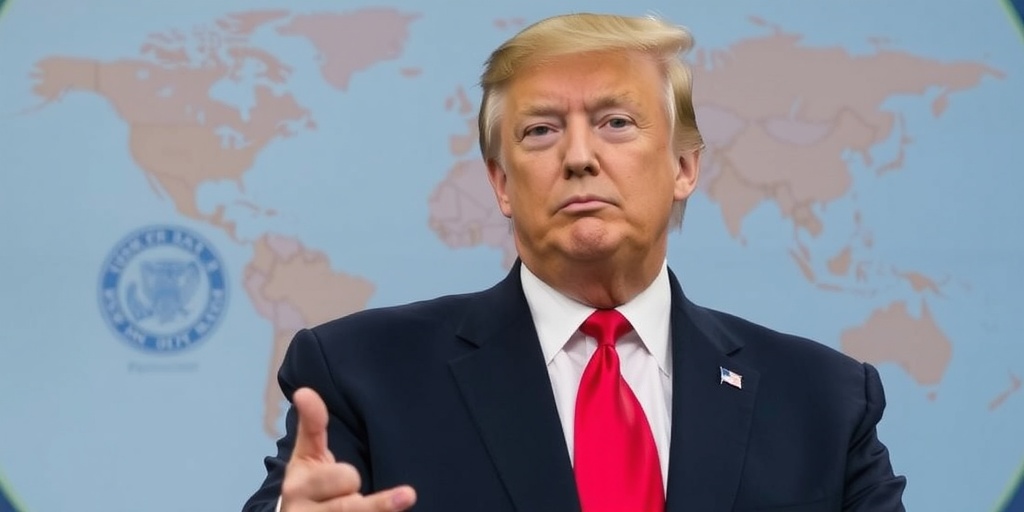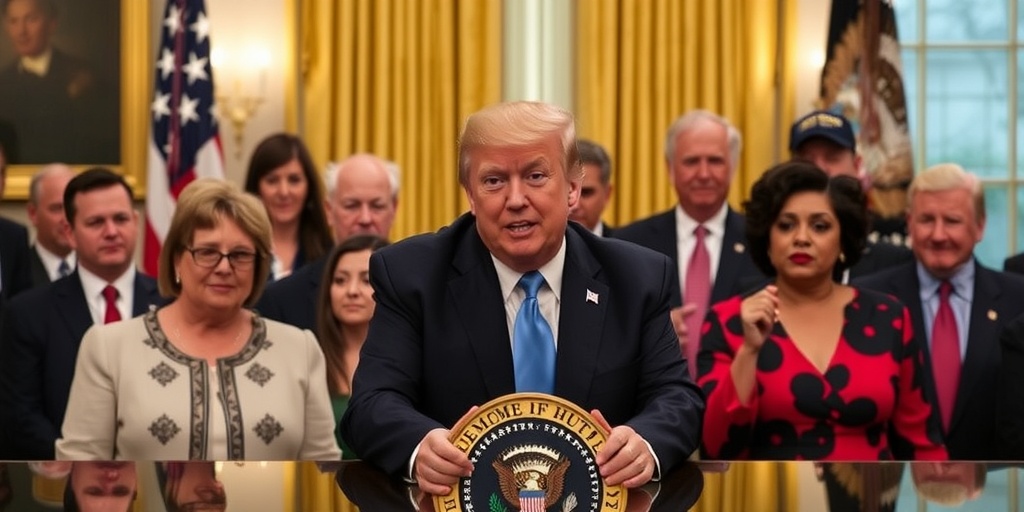Now Reading: Trump Administration Slashes Nearly 10,000 Foreign Aid Programs
-
01
Trump Administration Slashes Nearly 10,000 Foreign Aid Programs
Trump Administration Slashes Nearly 10,000 Foreign Aid Programs

Trump Administration Cuts International Aid Amid Legal Battle
In a surprising move, the Trump administration announced on Wednesday the termination of nearly 10,000 contracts and grants from the U.S. Agency for International Development (USAID) and the State Department. This decision includes the cancellation of vital programs aimed at HIV prevention and treatment, which had previously been shielded from cuts under a blanket freeze on foreign aid initiated on President Trump’s first day in office.
The announcement came in a legal filing made to a federal judge, revealing that the administration is unable to meet a soon-to-expire deadline for the disbursement of funds allocated for completed foreign aid projects. The abrupt cuts to these programs, which have been integral to global health and development efforts, left many diplomats and aid workers in disbelief, especially following significant layoffs at USAID, which oversees programs related to food security, health, development, and democracy abroad.
Many officials from aid organizations and USAID expressed their concerns that crucial funding for the President’s Emergency Plan for AIDS Relief (PEPFAR) has been withdrawn, affecting components of the initiative deemed essential and previously exempted from the foreign aid freeze.
The cuts were revealed in a status report concerning the administration’s compliance with a February 13 ruling by Judge Amir H. Ali of the Federal District Court in Washington, D.C. Judge Ali had mandated that USAID and the State Department release funds promised to foreign aid contractors and organizations, claiming that the U.S.-backed programs are critical for saving lives and bolstering the nation’s influence globally. Despite the ruling, several aid organizations have reported that their funding remains stalled or has not been restored, leading to concerns about the viability of their operations.
In January, shortly after taking office, President Trump ordered a halt to almost all foreign aid spending for a 90-day review period. This decision has been met with legal challenges from various aid groups, which argued that the pause compromises their missions and the well-being of millions who rely on U.S. aid.
As part of this evolving situation, Judge Ali had previously issued an order stating that all funding for ongoing contracts, grants, and other forms of foreign assistance, existing as of January 19, should be disbursed. However, at a recent court hearing, the judge noted the apparent lack of progress on funds flow, prompting him to set a new deadline for any outstanding payments to be addressed.
The administration, in its recent court filing, contended that it had complied with the court’s directives by evaluating and finalizing decisions regarding the contracts and grants. They reported that they managed to identify approximately 3,200 contracts and grants that would continue, asserting that they were fully committed to advancing with the rest of the awards.
Yet, when pressed by Judge Ali during the hearings, government lawyers were unable to demonstrate any evidence of funds being dispensed since his February order. Observing the critical nature of the situation, the judge emphasized the urgency of the matter and insisted that any overdue payments necessitated immediate action.
The precarious situation was further complicated by logistical challenges, as outlined by Pete Marocco, a senior Trump appointee in charge of foreign aid. Marocco conveyed that the two agencies are currently processing outstanding payment requests totaling nearly $2 billion, which cannot be resolved in the time frame imposed by the judge.
As the aid community grapples with these disruptions, lawyers representing various aid groups have pointed to troubling patterns in the administration’s funding review process. New layers of scrutiny have been introduced for disbursing foreign assistance funds, including requirements for detailed justifications for expenditures that had previously passed through established approval mechanisms.
This ongoing legal tussle and the resultant funding freeze have serious implications for programs that provide life-saving assistance, such as those combating malnutrition and maternal health. Aid workers have highlighted the devastating consequences of the funding lapses, noting that vulnerable populations — including starving children and pregnant women — are being severely impacted.
In light of the developments presented in the joint status report, it remains uncertain what the next steps will be regarding the ongoing lawsuit against the administration. The temporary restraining order issued by Judge Ali is set to expire imminently, creating an atmosphere of urgency as both sides seek clarity in the path forward. The administration has expressed the need for more time to navigate the complexities of resuming aid disbursements, suggesting that reinstating previously suspended funding is far more intricate than simply turning a faucet back on.
Stay Informed With the Latest & Most Important News
Previous Post
Next Post
Previous Post
Next Post
-
 01New technology breakthrough has everyone talking right now
01New technology breakthrough has everyone talking right now -
 02Unbelievable life hack everyone needs to try today
02Unbelievable life hack everyone needs to try today -
 03Fascinating discovery found buried deep beneath the ocean
03Fascinating discovery found buried deep beneath the ocean -
 04Man invents genius device that solves everyday problems
04Man invents genius device that solves everyday problems -
 05Shocking discovery that changes what we know forever
05Shocking discovery that changes what we know forever -
 06Internet goes wild over celebrity’s unexpected fashion choice
06Internet goes wild over celebrity’s unexpected fashion choice -
 07Rare animal sighting stuns scientists and wildlife lovers
07Rare animal sighting stuns scientists and wildlife lovers





















